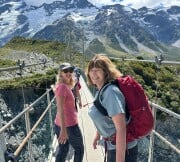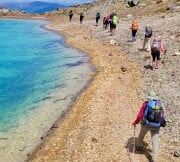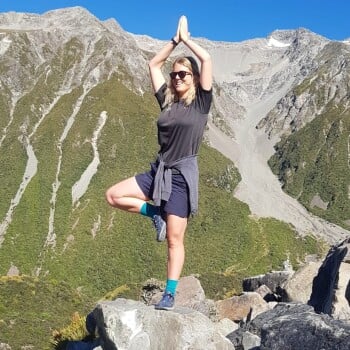- About Us
-
Trips
-
 Kiwi-Style Hiking
Kiwi-Style Hiking
-
 Great Walks
Great Walks
-
 Hiking Tours
Hiking Tours
-
 Alpine Hikes
Alpine Hikes
-
 Custom Groups
Custom Groups
- Huayhuash Trek
- Family Northern Explorer
- Family Southern Explorer
- Lake Waikaremoana Hike
- Women's Custom Tours
- Women's Southern Wilderness
- Coast, Canyons and Mountains
- Coastal Wanderer Custom Tour
- Don't Cross the Ladies
- Secret South Custom Tour
- Tekapo Hike
- West Coast Custom Tour
- World Heritage Custom Tour
-
- Blog
- Shortlist
- About Us
- Trips
- Blog
- Shortlist

Feb 12, 2024
Multi-day hikes can lead to thrilling adventures that promise breath-taking landscapes, physical challenges, and a unique connection with nature. However, to ensure a successful and enjoyable journey, proper preparation is key. Here are five essential steps to take before setting out on a multi-day hike.
Physical Conditioning
Multi-day hikes are physically demanding. It’s important that you take into account your current level of fitness, and make a plan to prepare your body (and mind) for your next adventure. In order to maximise your own enjoyment (and safety), investing time and energy into physical preparation is essential.
Start a conditioning routine well in advance to build strength, stamina, and endurance. Focus on cardiovascular exercises, such as hiking, running, or cycling, to prepare your body for sustained physical activity. Additionally, incorporate strength training exercises to build muscle and improve overall stability. A well-conditioned body is more resilient to the challenges of long hikes and helps prevent injuries.
It's important that you don’t rush progress. Ideally, give yourself time to begin your conditioning routine several weeks before your hike. Start with moderate-intensity exercises and gradually increase the intensity and duration over time. And be sure to avoid overexertion, as pushing yourself too hard too soon can lead to injuries.

Cardiovascular Training
Hiking: There is no better way to prepare for a hike, than by hiking. Mimic the demands of your upcoming hike by incorporating regular hiking sessions into your training routine. Gradually increase the distance and elevation to build stamina. We suggest wearing your hiking boots on these hikes to get used to walking in them, and eventually walking with your pack on as well. You can gradually increase the weight in that pack.
Running or Cycling: Alternate between running and cycling to enhance cardiovascular endurance. These exercises simulate the sustained effort required during long hikes.
Strength Training
Legs and Core: Focus on strengthening your legs and core muscles, as these are crucial for stability and endurance on the trail. Squats, lunges, and core exercises like planks are beneficial.
Back and Shoulders: Strengthen your back and shoulder muscles to better support your backpack's weight. Body weight exercises are fine ways to strengthen these muscles, and doing practice hikes with a gradually increasing weight in your pack will help as well.
Flexibility and Mobility:
Incorporate stretching and mobility exercises into your routine to enhance flexibility and reduce the risk of muscle strains. Pay special attention to areas prone to tightness, such as the hips, hamstrings, and calves. Consider yoga to improve balance and flexibility, which are valuable for navigating varied terrain during a hike. Include dynamic stretches before your workouts and static stretches afterwards.
Sneak Additional Exercise into Your Day:
Look for opportunities to add extra physical activity to your daily routine. Take the stairs instead of the elevator or walk and cycle for short errands.
Sneaking in additional exercise helps boost overall fitness levels and contributes to the success of your conditioning program.
Rest and Recovery:
Schedule rest days in your training plan to allow your body to recover. Prioritise quality sleep, as it plays a crucial role in muscle recovery and overall well-being. Listen to your body and adjust your training intensity or take extra rest if you experience fatigue or soreness.
By incorporating these training tips into your physical conditioning routine, you'll be better prepared to tackle the challenges of a multi-day hike. Building a strong foundation of fitness not only enhances your hiking performance but also reduces the risk of injuries, allowing you to fully enjoy the adventure ahead.

Research and Plan Your Route
Before lacing up your boots, thoroughly research and plan your hiking route. Consider factors such as trail difficulty, elevation changes, and available water sources. Check weather forecasts for the duration of your hike and familiarize yourself with any potential hazards or trail closures. A well-planned route not only enhances safety but also contributes to a more enjoyable experience.
Gear Check and Packing Essentials
Your gear can make or break your multi-day hiking experience. Perform a thorough gear check to ensure everything is in working order. Pay special attention to your hiking boots, backpack, and sleeping bag. Make a checklist of essential items, including clothing, food, water purification tools, navigation equipment, and a first aid kit. Pack efficiently, prioritising lightweight and compact gear to minimise the burden on your back during the hike, and be sure to use this gear before the hike. It is essential to break your boots in before committing to a long hike, and to fit your pack properly. If using a tent, camping stove, etc, it's well worth your time to do some practice runs in advance of your adventure to avoid any frustrating learning curves while you’re out.
Nutrition and Hydration Planning
Proper nutrition and hydration are crucial for maintaining energy levels during a multi-day hike. Plan your meals and snacks to provide a balance of carbohydrates, protein, and healthy fats. Consider lightweight, non-perishable foods that are easy to prepare on the trail. Hydration is equally important, so invest in a reliable water filtration system and carry enough water or identify water sources along your route. Dehydration can quickly lead to fatigue and diminished performance, so stay mindful of your fluid intake.
You will require more fuel while hiking than in everyday life. Don’t cut corners when packing food – you’ll regret it. Also, consider the amount of waste your food will create. You’ll have to pack all of your rubbish out, so plan how you will contain it (maybe remove excessive outer packaging before starting the hike, for example).

Emergency Preparedness
No matter how well you plan, it's essential to be prepared for the unexpected. Carry a comprehensive first aid kit and know how to use its contents. Take an emergency blanket. Familiarise yourself with basic wilderness first aid procedures. Share your hiking itinerary with a trusted friend or family member, and check in regularly if possible. Carry communication devices such as a charged mobile phone or a personal locator beacon for emergencies. Being prepared for unforeseen circumstances adds an extra layer of safety to your multi-day hiking adventure.
Multi-day hikes offer the opportunity to experience the world in a different way. They can provide the perfect break from every-day life, and take you to new places, with new views, and to some of the most stunning scenery in the world. By thoroughly researching your route, checking and packing the right gear, conditioning your body, planning your nutrition and hydration, and preparing for emergencies, you set the stage for a successful and memorable adventure. Taking the time to prepare ensures that you will actually enjoy your adventure, and will allow you to fully immerse yourself in the beauty of nature, overcome challenges, and create lasting memories along the trail!







